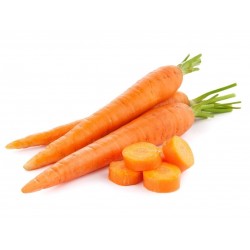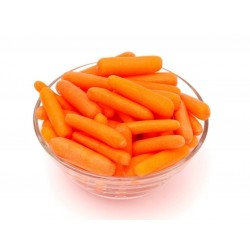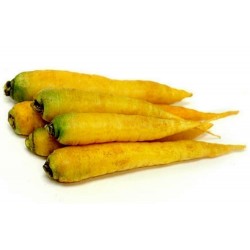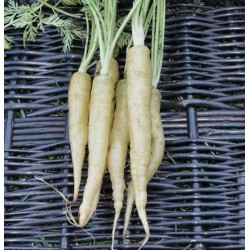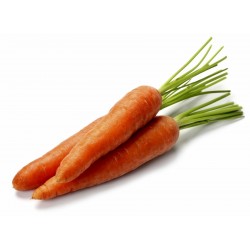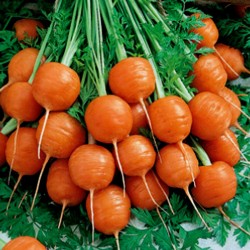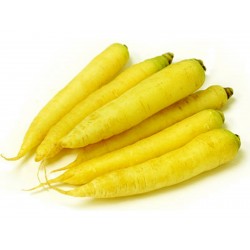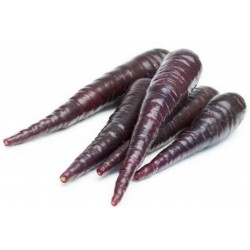
Carrot Nantes 11000 seeds
Pret
9,00 €
SKU: VE 110 (20g)
Seeds Gallery Com,
5/
5
<div>
<h2><span style="font-size: 14pt;"><strong>Carrot Nantes 11000 seeds</strong></span></h2>
<h2><span style="color: #ff0000;"><strong><span style="font-size: 14pt;">Price for Package of 11000 seeds (20g).</span></strong></span></h2>
<div>Developed in the area of the town of Nantes, France, this classic carrot is famous for flavor and a big crunch. Bright orange flesh is fine grained with almost no core. Roots average 6-7” long with blunt ends and small to medium tops. Shorter roots make the Scarlet Nantes carrot successful in some soils where longer-rooted varieties have trouble developing fully.</div>
</div>
<div>Sowing Instructions</div>
<div>Site & Soil</div>
<div>Get the soil conditions correct and carrots are one of the easiest vegetables to grow in the cooler climates. Incorrect soil conditions lead to mis-shapen carrots - these may well cause a chuckle when dug up, but they are not so well appreciated at cooking time! Carrots prefer a light soil which has been improved with lots of well-rotted organic material fully dug into the soil. Carrots grown on heavy soil, or where organic material is not well-rotted, will become misshapen and grow 'forked. Stones in the soil will have the same bad effect. Prepare the bed two weeks or so before planting, forking in a handful of bonemeal for each square metre (yard). Ensure that the soil is dug to a spade's depth and is of a crumbly texture.</div>
<div>When to Sow</div>
<div>Sow seeds from early spring to autumn</div>
<div>How to Sow</div>
<p>Using a trowel, dig out narrow drills 2cm (3/4inch) deep and 12cm (8inches) apart. Carrot seed is fine - the easiest way to sow is to empty some seed from the packet into the palm of your left hand and and take small pinches of seed with your right hand fingers, dropping a couple of seeds every 2.5cm (1 inch) along the narrow drills. Sow the seed thinly to avoid too much thinning out later. Cover the seeds with fine soil very gently firming it down. Water with a fine spray if the conditions are dry. The seedlings should start to appear 15 to 20 days later.</p>
<table class="data-table"><colgroup><col width="25%"><col></colgroup>
<tbody>
<tr class="first odd">
<th class="label"> </th>
<td class="data last"><span style="color: #008000;">Details</span></td>
</tr>
<tr class="even">
<th class="label"><span style="color: #008000;">Common Name</span></th>
<td class="data last"><span style="color: #008000;">Carrot</span></td>
</tr>
<tr class="odd">
<th class="label"><span style="color: #008000;">Botanical Name</span></th>
<td class="data last"><span style="color: #008000;">Daucus</span></td>
</tr>
<tr class="even">
<th class="label"><span style="color: #008000;">Light Requirements</span></th>
<td class="data last"><span style="color: #008000;">Full Sun</span></td>
</tr>
<tr class="odd">
<th class="label"><span style="color: #008000;">How to Grow</span></th>
<td class="data last"><span style="color: #008000;">Direct Sow</span></td>
</tr>
<tr class="even">
<th class="label"><span style="color: #008000;">Planting Depth</span></th>
<td class="data last"><span style="color: #008000;">1/4 inch</span></td>
</tr>
<tr class="odd">
<th class="label"><span style="color: #008000;">Planting Time</span></th>
<td class="data last"><span style="color: #008000;">Cool Season</span></td>
</tr>
<tr class="even">
<th class="label"><span style="color: #008000;">Seed Spacing</span></th>
<td class="data last"><span style="color: #008000;">1/2 inch</span></td>
</tr>
<tr class="odd">
<th class="label"><span style="color: #008000;">Row Spacing</span></th>
<td class="data last"><span style="color: #008000;">12-15 inches</span></td>
</tr>
<tr class="even">
<th class="label"><span style="color: #008000;">Space After Thinning</span></th>
<td class="data last"><span style="color: #008000;">1-2 inches</span></td>
</tr>
<tr class="odd">
<th class="label"><span style="color: #008000;">Days to Germination</span></th>
<td class="data last"><span style="color: #008000;">6-53</span></td>
</tr>
<tr class="even">
<th class="label"><span style="color: #008000;">Days to Harvest</span></th>
<td class="data last"><span style="color: #008000;">65</span></td>
</tr>
<tr class="odd">
<th class="label"><span style="color: #008000;">Ways to Grow</span></th>
<td class="data last"><span style="color: #008000;">Small Gardens</span></td>
</tr>
<tr class="even">
<th class="label"><span style="color: #008000;">In the Kitchen</span></th>
<td class="data last"><span style="color: #008000;">Freezing, Roasting, Salads, Steaming</span></td>
</tr>
<tr class="odd">
<th class="label"><span style="color: #008000;">Estimated Mature Height</span></th>
<td class="data last"><span style="color: #008000;">8-12 inches tall</span></td>
</tr>
<tr class="even">
<th class="label"><span style="color: #008000;">Is It Heirloom?</span></th>
<td class="data last"><span style="color: #008000;">Yes</span></td>
</tr>
<tr class="odd">
<th class="label"><span style="color: #008000;">Is It Organic?</span></th>
<td class="data last"><span style="color: #008000;">Yes</span></td>
</tr>
<tr class="even">
<th class="label"><span style="color: #008000;">Ships As</span></th>
<td class="data last"><span style="color: #008000;">Seed</span></td>
</tr>
<tr class="last odd">
<th class="label"><span style="color: #008000;">Ships to Worldwide</span></th>
<td class="data last"><span style="color: #008000;">Yes</span></td>
</tr>
</tbody>
</table>
VE 110 (20g)

- Nou




